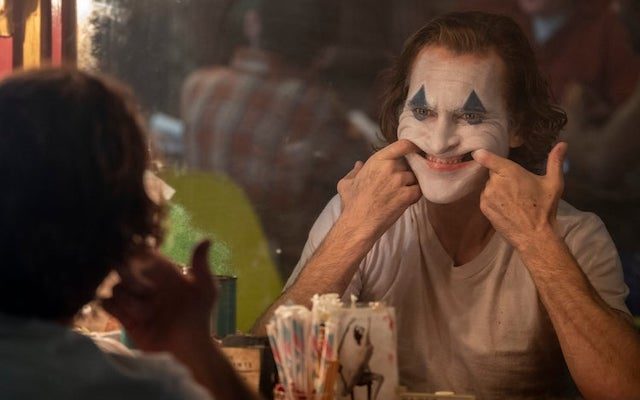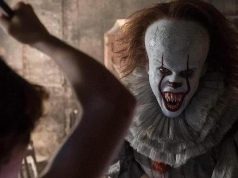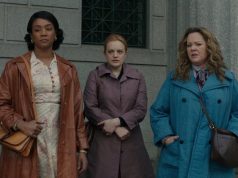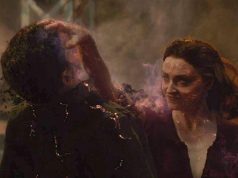
Being the origin story of the title villain, “Joker” is technically a Batman prequel and technically a comic book movie, but director and co-writer Todd Phillips (“The Hangover,” “Old School”) doesn’t want you to think of it as those things. He’s going for a gritty Martin Scorsese vibe — “The King of Comedy” specifically (most of the plot is borrowed from it), with a splash of “Taxi Driver.” Those movies’ ideas about fame, mental illness, and urban decay are probably more relevant in 2019 than they were when they came out, but “Joker” raises them only halfheartedly and addresses them not at all. It’s a gritty, Very Serious, faux-provocative movie with nothing to say.
Set during a garbage strike in 1981 in a version of Gotham City where everyone has New York accents, the film stars a deeply committed Joaquin Phoenix as Arthur Fleck, a dangerously skinny, mentally unwell man who’s spent time in the bin and now works as a part-time clown while living with his invalid mother, Penny (Frances Conroy). Arthur’s mental condition causes him to laugh at inappropriate times; that and his generally erratic behavior make him the target of bullying from disrespectful youths and Wall Street bros alike. (One of the latter taunts Arthur on the subway by singing “Send in the Clowns” at him, Sondheim showtunes being one of the usual ways that Wall Street bros torment their lessers.)
Arthur wants to be a standup comedian and dreams of appearing on “Live with Murray Franklin” (think Johnny Carson’s “Tonight Show”), whose host is played by Robert De Niro. That’s a bit of stunt casting, of course; De Niro played what would have been the Joaquin Phoenix role in “The King of Comedy” (Jerry Lewis was the TV host). Phoenix’s performance here sometimes recalls an early-period De Niro, while De Niro’s own performance recalls a late-period De Niro, i.e., phoned-in and disinterested. His Murray Franklin is stiff and ungainly, like a last-minute guest host who is uncomfortable being on TV. Like Robert De Niro, in other words.
One way that this is not your father’s comic book movie is that Arthur straight-up murders people, gunshot to the head, blam. His execution of some wealthy dudes who worked for Wayne Enterprises leads local tycoon Thomas Wayne (Brett Cullen) to go on TV and say, essentially, that poor people are clowns. This somehow leads to a political movement (“We are all clowns,” etc.) and eventually to riots, but Arthur isn’t part of this and the movie doesn’t develop the income-inequality theme.
Nor does Phillips do much with the idea of marginalized, unstable men with violent tendencies, or our treatment of the mentally ill, or any of the other subjects that arise. Phoenix’s portrayal of mental illness is convincing and worthy, but neither Arthur Fleck nor his actions are interesting. I kept thinking: If I didn’t know the Batman connection and thought I was just watching some anonymous deranged character, would I find his story compelling? And the answer kept being no, not really. He’s unpredictable, but not particularly scary or menacing. It probably didn’t help that I recently re-watched “King of Comedy,” of which “Joker” is a photocopy of a photocopy.
There has been concern that this movie will inspire violence. I find it unlikely that it will inspire anything. It barely inspired me to write a review. The violent content in the film isn’t ideological — he doesn’t kill anyone because of what they believe or what they represent. “Rambo: Last Blood,” which is more graphically violent and is ideological, is the one I’d be worried about (if anyone saw it). “Joker” tries hard to be edgy but is too shallow to have any impact.
C (2 hrs., 1 min.; )





